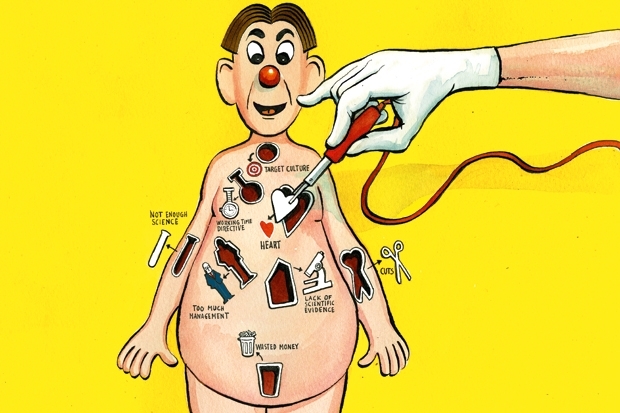How do I know that Britain’s Covid crisis is over? The fakers are back. The hypochondriacs, the psychosomatics, the pseudo-fitters, the attention-seekers and the lonely. They’ve started to return to the acute medical ward where I work. They’ve been gone so long I actually almost missed them.
This collection of patients, who take up time and resources inversely proportional to the state of their physical health, simulate symptoms for gain (malingerers), simulate/induce their symptoms for the pleasure of the sick role (Munchausen’s syndrome) or genuinely experience symptoms such as pain, seizures or paralysis in atypical ways with no physically identifiable or treatable cause (now vaguely termed ‘functional disorders’).
Members of the first two categories often end up with the label of the third because it is easier than confronting them about their behaviour, though in my experience this only emboldens them to continue abusing services. Before the pandemic, they took up a huge amount of time and resources at the expense of others, and often with no satisfactory outcome for anyone involved. Even the patients who have serious psychiatric causes for their presentations almost never have them addressed by coming to hospital, because of the woeful provision of psychiatric services that might be able to help.

The cost to the NHS has been estimated at £3 billion a year. For comparison, the much debated 1 per cent pay rise for all nurses will cost about £200 million next year. The near total absence of these patients from our hospital wards over the past 12 months at least gives me hope that there has been one saving for the health service among all the excesses. It has certainly given frontline clinicians more time to deal with the truly unwell. So how did this minor miracle come about?
Most of the fakers, realising that hospital had become a dangerous place where they might actually get seriously sick from Covid, decided that they just happened to be feeling a lot better or could manage their previously debilitating conditions at home. Of course, some of them, the Munchausens in particular, did try to come in despite — or because of — the risk to themselves. But for the first time in my professional life, they were met with a united front and the kind of approach that should always have prevailed in a finite, socialised health system. Crisis mentality and palpable scarcity demanded military-style triage and clarity about what mattered.
Our wards are packed with people struggling to reproduce the symptoms of complex syndromes believably
If they were objectively well and free from Covid, they were turned around at the front door. My colleagues agree that it was one of the few positive side effects of the crisis. Patients with early signs of cancer not having access to services due to the pandemic is a tragedy. A well-known malingerer not receiving his tenth unnecessary CT scan is something no one should mourn, malingerer included. Exposing people to radiation without good reason, particularly when young, may contribute to serious long-term harm. More invasive investigations, such as those for possible brain haemorrhages and paralysis, ironically put the patients at risk of developing real haemorrhages and paralysis.
Unfortunately, now that the virus is receding following the success of the vaccine programme, the fakers have burst back into hospital, keen to make up for lost time. Our wards, so recently full of victims of the pandemic who were struggling to breathe, are now packed with people struggling to reproduce the symptoms of complex syndromes believably. Google helps them to be pretty convincing if they do their homework and commit to the role, but most slip up quite quickly: the girl with the supposed meningitis and photophobia who can tolerate scrolling her brightly lit Instagram for hours on end; the man with unexplainable paralysis who withdraws his legs instinctively from a needle; the lady with bizarre seizures who insists that only high doses of benzodiazepines help, but also stops fitting and recovers abruptly if her phone rings and it might be important.
Before Covid, even obvious fakers like this achieved long admissions with extensive investigations because of the unwillingness of everyone to show them the door. Better to waste health professionals’ time, taxpayers’ money and hospitals’ beds on these demanding customers than to risk a complaint if they felt mistreated.
It all started again when a couple of tentative pseudo-fitters dipped a faux-spasming toe in the supposedly no-nonsense waters of our emergency department. They put on a good comeback show. The bed manager admitted that we had space, a lot of space actually, and a soft-hearted medical registrar let them in.
The next day I was faced with the absurdity of the old NHS that I thought we’d left behind. On one bay in an acute medical ward there were two young ladies pseudo-fitting to their hearts’ content, with nurses, healthcare assistants and junior doctors flapping around them just like they used to. In the corner opposite, a tired lady who had undergone major surgery for a brain tumour the week before and had been re-admitted with genuine, life-threatening epileptic seizures sat quietly, ignored.
The old spirit of plenty was back, and my colleagues buckled under it. ‘We’ve got the space. They’ll go when they’re ready. They might actually have developed a real pathology this time. We don’t want to miss something serious. Let’s do a CT and MRI just to be sure. Better safe than sorry.’






Comments